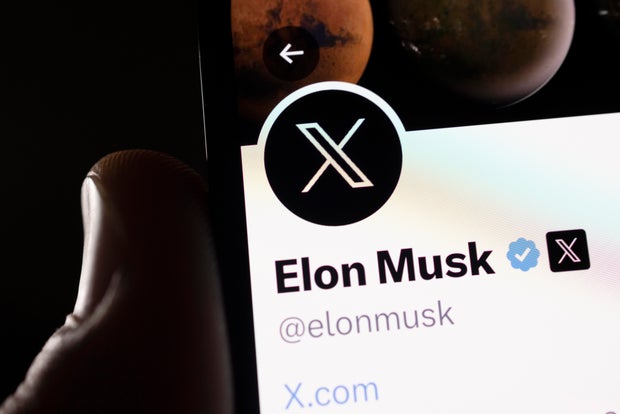The internet is buzzing this weekend as the app formerly known as Twitter announced a name change. X.com has been redirected to Twitter.com, yet the social media platform continues to ask users to "tweet."
The rebranding is another step in Twitter's continuous evolution from an online hangout for hyper-connected individuals to an app that can do "everything," according to CEO Linda Yaccarino.
"X is the future state of unlimited interactivity centered on audio, video, messaging, payments/banking — creating a global marketplace for ideas, goods, services, and opportunities," she said on the platform. "Powered by A.I., X will connect us all in ways we're only just beginning to imagine."
Here's what the transition means for X as Elon Musk attempts to revamp Twitter, which he purchased for $44 billion in 2022.
What will the app do now?
Musk has been vocal about his goal of turning Twitter into a so-called super-app, something akin to China's WeChat. For now there's no American equivalent, but industry experts imagine an app that encompasses basically anything a person wants to do online.
"Consumers of the app can do a lot of different things on the platform, whether it's listen to a podcast, shop, watch videos," said Nii Ahene, chief strategy officer of marketing firm Tinuiti.
Twitter already lets users engage in live audio conversations, send longer text messages and broadcast video, such as the new show former Fox News host Tucker Carlson recently launched on the platform. If Twitter's push into paid subscriptions is successful, it could eventually expand into sharing some subscription revenue with users.
"In theory, they can become a more mainstream version of Patreon or other similar platforms," Ahene said. "Whether they succeed remains to be seen. It's not the reason people go to Twitter today, so to reposition the company … would take significant investment and time with what's really a skeleton team."
What's with the letter X?
Musk appears to have a longstanding fixation on the letter X, dubbing his very first startup X.com. (After a merger, the app became PayPal, although Musk reportedly pushed for it to keep the name X, according to biographer Walter Isaacson.) After buying Twitter, Musk reportedly texted Isaacson that he was "very excited about finally implementing X.com as it should have been done, using Twitter as an accelerant!"
The letter X surfaces throughout Musk's other endeavors as well, including his space-exploration venture SpaceX, his recently launched artificial-intelligence app xAI and the Model X, one of electric car company Tesla's earliest models. Musk even refers to his son with singer Grimes, by the name X.
"It's just X, the letter X," he said on the Joe Rogan Experience recently, explaining how to pronounce his son X Æ A-XII's name.
Musk regained ownership of X.com six years ago. He formally changed Twitter's legal name to X Corp in April. Over the weekend, X.com was redirected to Twitter.com, and on Monday a crane began to remove Twitter's iconic bird logo from the company's San Francisco headquarters. However, police stopped the work soon after it began.
What does this mean for Twitter?
For now, the platform's rebrand is just a name change — no new features have been introduced, staying true to Musk's apparent preferred product strategy of hype first, delivery much later.
But the name change suggests Musk is likely to keep control of the company for the near future, said Bloomberg Intelligence analyst Mandeep Singh. After Musk's takeover in April of 2022, some observers believed the billionaire could make some changes to Twitter and quickly flip it to a different owner, Singh said.
"That option is off the table now given the name change — I don't think there's any other prospective buyer who will take it now," he said.
What are the roadblocks?
To be sure, there are many ways an "everything app" could fail, from simply confusing its users to struggling to attract enough advertisers. "If you look at what Tesla's done in terms of advertising, which is very little, [Musk's] belief is that good product sells itself and you don't need to advertise it. Meanwhile, you have many, many large brands and companies that spend millions of dollars on Twitter and would beg to differ," said Aaron Goldman, chief marketing officer for Mediaocean, an advertising partner of Twitter's.
Expanding the platform's reach to include things like shopping and paid subscription content could actually help it flourish in the long term by creating several revenue streams and making it less reliant on large companies' willingness to spend money, analysts said.
In the short term, building out those capabilities would require a massive investment in staff and infrastructure. It's far from clear if a company that slashed about three-quarters of its staff and is now embroiled in multiple lawsuits over unpaid bills can deliver that.
"The investment is a lot in terms of cloud infrastructure — we're talking about $40 billion, $50 billion in upfront investments," Singh said. "Twitter as a standalone app doesn't have the infrastructure to become an everything app."

